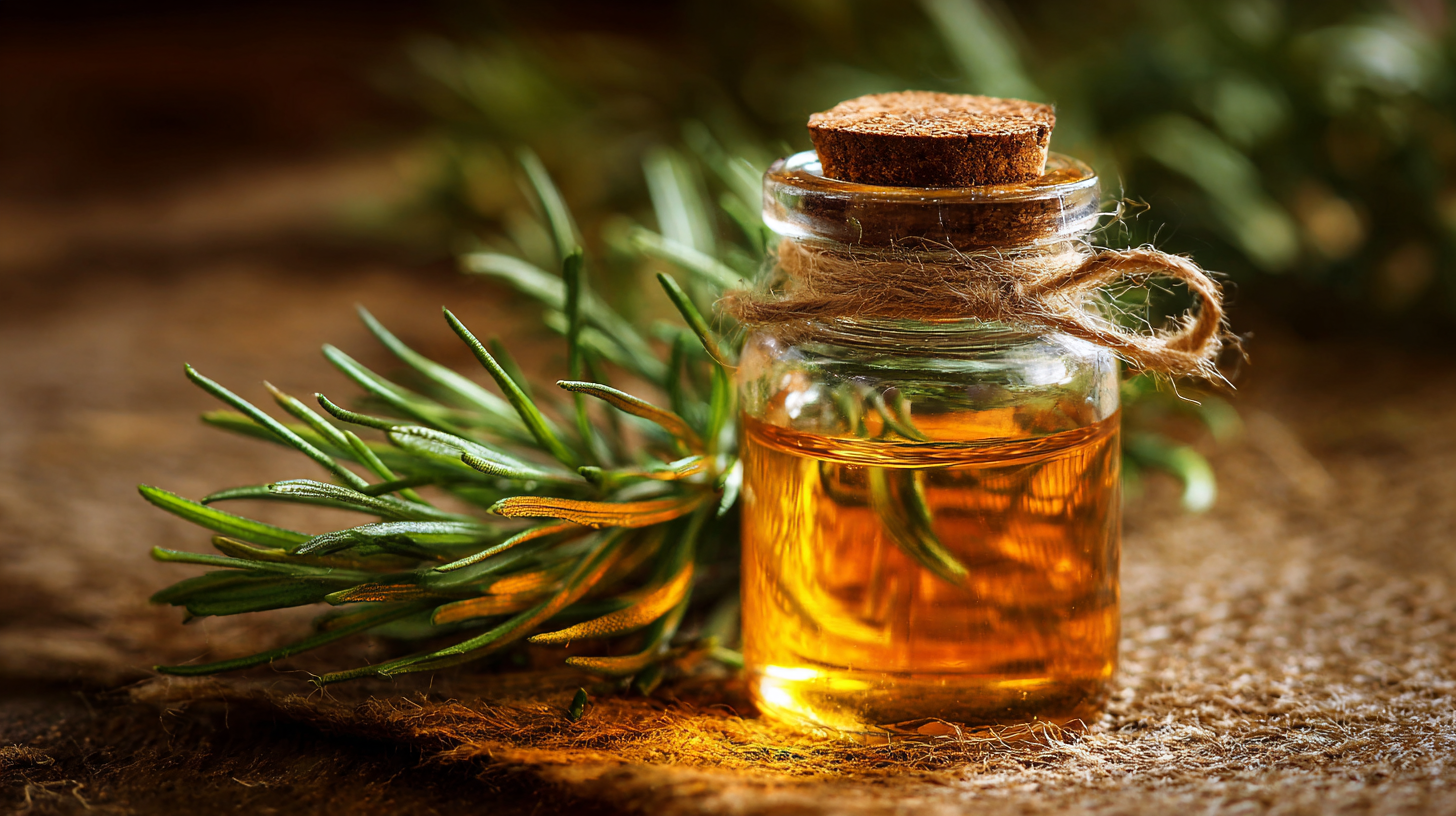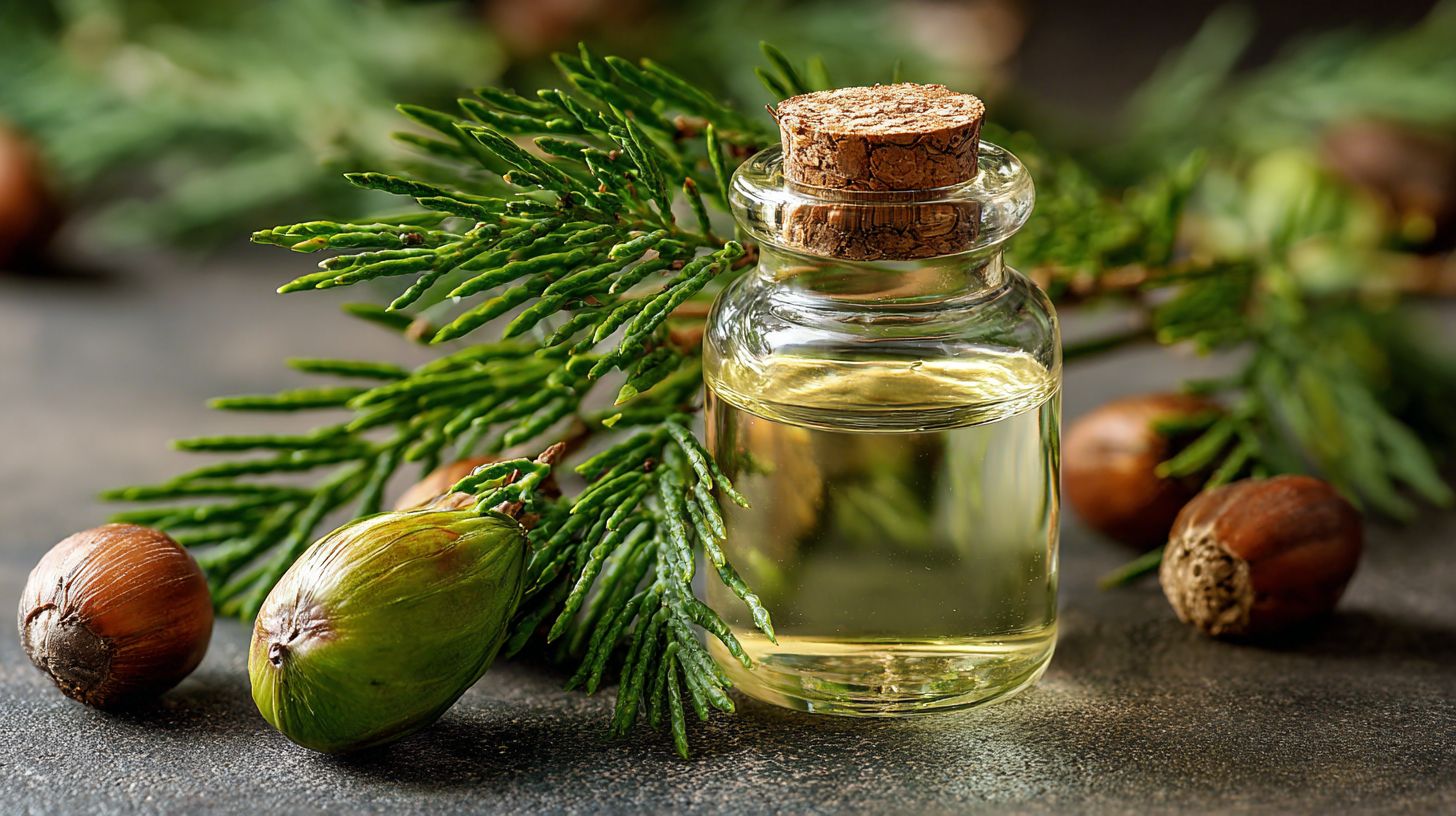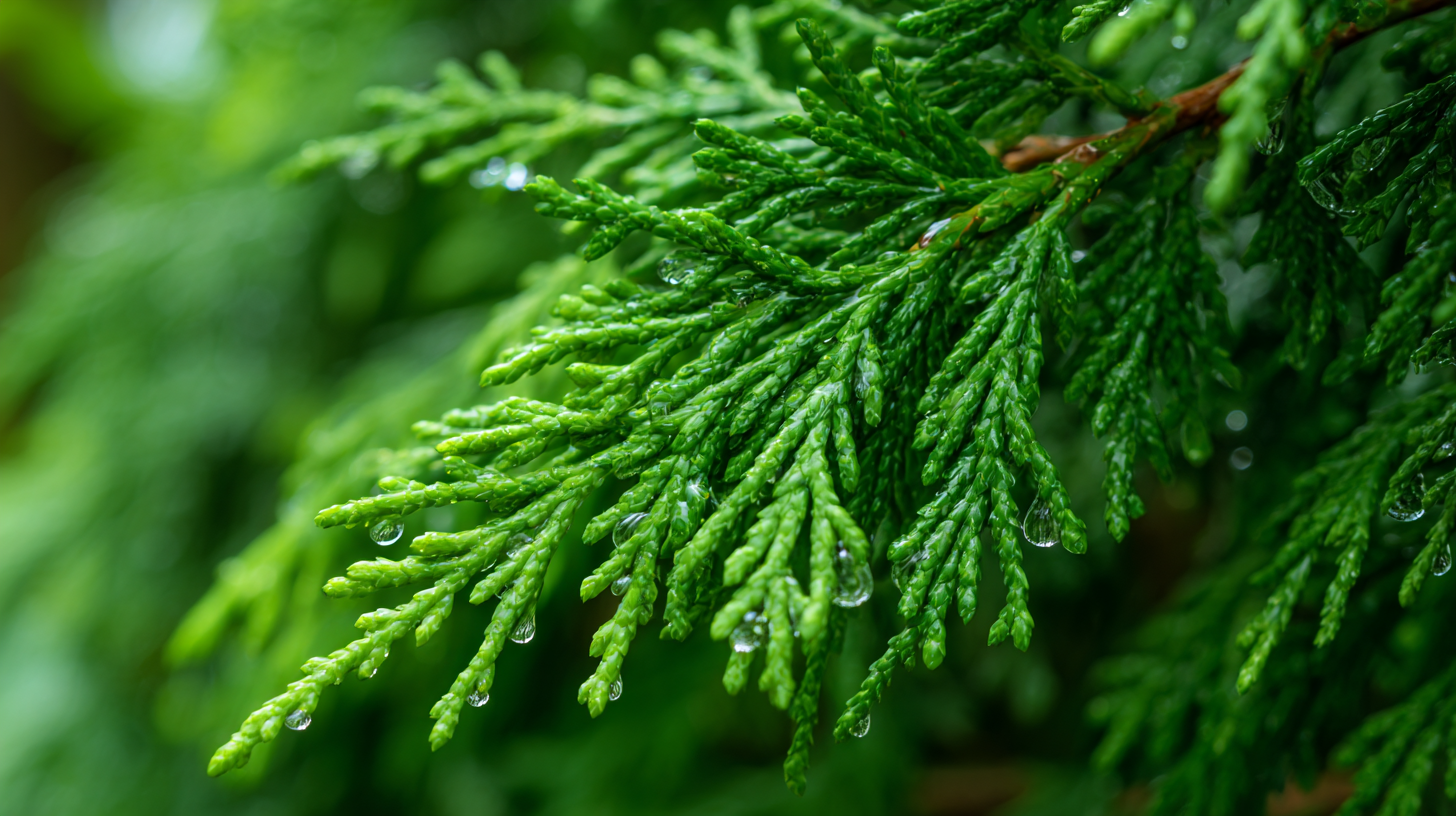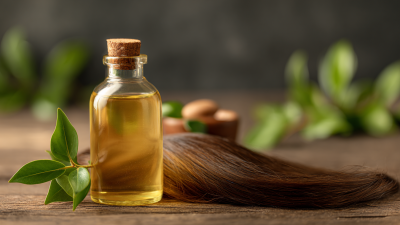Cypress Oil For Skin Benefits Compared to Other Essential Oils
Table of Contents
- Benefits of Cypress Oil for Skin: An Overview
- Cypress Oil vs. Lavender: Which Essential Oil Is Better for Skin Care?
- Exploring the Antimicrobial Properties of Cypress Oil for Healthier Skin
- Cypress Oil for Oily Skin: A Natural Solution for Excess Shine
- How to Incorporate Cypress Oil into Your Skincare Routine
- Safety Tips for Using Cypress Oil on Skin: What You Need to Know
- FAQS
- Conclusion
- Related Posts
Lately, more and more folks are getting into natural remedies for their skincare routines, and that’s really boosting interest in different essential oils—Cypress Oil included. If you look at industry reports, the global market for essential oils is expected to hit around USD 13.94 billion by 2026. That’s a clear sign that people are seriously looking for natural alternatives when it comes to personal care and beauty products. Cypress Oil, with its astringent and antiseptic qualities, offers some pretty unique benefits for the skin—definitely standing out compared to other oils like tea tree or eucalyptus. Companies like Jiangxi Baicao Pharmaceutical Co., Ltd. are doing a great job too—they specialize in making top-quality natural and plant-based oils, using local herbs to craft effective formulations. So, by checking out Cypress Oil for skincare, folks can tap into the goodness of nature for healthier skin while also supporting this awesome trend toward eco-friendly and sustainable beauty practices.

Benefits of Cypress Oil for Skin: An Overview
You know, cypress oil—it's made from the twigs and leaves of the cypress tree—has actually become pretty popular for its skin benefits. People love it because of its astringent properties, which help tighten and tone the skin. If you have oily or breakout-prone skin, this might be just what you need. It works to cut down on excess oil, which means your pores look smaller and your skin feels smoother. Plus, it has antimicrobial qualities, so it can help fend off infections and calm down irritation, leaving your skin clearer and healthier overall.
Compared to other essential oils like tea tree or lavender, cypress oil is kinda unique because it boosts circulation. That means it helps bring blood flow to your skin—giving you that healthy, radiant glow. It can also assist in healing scars and blemishes over time. And honestly, the scent itself is pretty calming, which can help reduce stress—something we all need, especially when it shows up on our skin. Whether you try it diluted for topical use or include it in your self-care routine for some relaxation, cypress oil really offers a well-rounded approach to skincare that benefits both your face and your mood.
Cypress Oil for Skin Benefits Compared to Other Essential Oils
Cypress Oil vs. Lavender: Which Essential Oil Is Better for Skin Care?
When it comes to essential oils for your skin, cypress and lavender are usually the first to come up in conversations. Cypress oil, with its astringent qualities, is pretty great at shrinking pores and controlling oil — so if you’re dealing with acne-prone skin, it might be just what you need. Plus, it helps boost circulation, which can give your complexion a nice glow and make your skin look healthier and more vibrant. On the flip side, lavender oil is well-known for its calming and soothing vibes. It’s often used to calm redness and irritation, and its anti-inflammatory properties help heal minor burns or cuts. Basically, it’s versatile and good for lots of skin issues.
Now, both oils have their own perks, but choosing between cypress and lavender really depends on what your skin needs. If oily skin or clogged pores are your main concern, cypress might be your best bet. But if your skin is sensitive, or if you’re into a kinda relaxing scent with your skincare, lavender’s a winner. Honestly, mixing both into your routine could be a smart move — you get the benefits of each and end up with healthier, happier-looking skin.
Exploring the Antimicrobial Properties of Cypress Oil for Healthier Skin
You know, cypress oil, which comes from the leaves and twigs of the cypress tree, is really gaining popularity these days—mainly because of its antimicrobial powers. It’s actually pretty impressive stuff when it comes to fighting bacteria and fungi, so it’s often seen as a natural way to support healthier skin. There was this study published in the *Journal of Essential Oil Research* that showed cypress oil was pretty good at stopping the growth of germs like Staphylococcus aureus and Candida albicans. Basically, it could be a handy natural remedy for skin infections.
But it’s not just about fighting off bacteria—cypress oil also has astringent qualities, meaning it can help tighten your skin, shrink pores a bit, and cut down on excess oil. That’s especially great if you’re struggling with oily or acne-prone skin. The *International Journal of Cosmetic Science* even pointed out that essential oils like cypress can boost your skin’s healing process, reduce inflammation, and help keep your skin elastic and looking healthy. Tossing some cypress oil into your skincare routine might help give you a clearer, more balanced complexion—and honestly, it might even outrank some other essential oils that aren’t quite as potent against microbes.
Cypress Oil For Skin Benefits Compared to Other Essential Oils
| Essential Oil | Antimicrobial Properties | Benefits for Skin | Suitable Skin Types |
|---|---|---|---|
| Cypress Oil | Strong antimicrobial effects against bacteria and fungi | Reduces inflammation, promotes healing, and tightens skin | Oily and combination skin |
| Tea Tree Oil | Highly effective against acne-causing bacteria | Treats acne, reduces oily skin, and calms irritation | Oily and acne-prone skin |
| Lavender Oil | Antimicrobial and soothing properties | Reduces redness, irritation, and promotes relaxation | All skin types |
| Peppermint Oil | Has antifungal and antibacterial properties | Soothes itching and provides a cooling sensation | Normal to oily skin |
| Geranium Oil | Effective against certain strains of bacteria | Balances skin’s oil production and improves skin elasticity | Dry and combination skin |
Cypress Oil for Oily Skin: A Natural Solution for Excess Shine
Lately, cypress oil has been gaining attention as a pretty awesome natural remedy if you’re dealing with oily skin. What’s cool about it is its ability to cut down on excess shine and help keep sebum production in check. Unlike a bunch of store-bought products that often end up stripping your skin and leaving it dry or irritated, cypress oil works to balance things out — it’s gentle but still super effective. So, if you're after a more natural way to manage oil without wrecking your skin, this might be just what you need.
Adding cypress oil into your skincare routine is actually pretty straightforward. Just mix a few drops with a carrier oil like jojoba or sweet almond oil, and then apply it to the areas that tend to get shiny. Its tightening effects help shrink pores and smooth out your skin’s texture. Plus, it has antibacterial and anti-inflammatory properties, which can be a real help in preventing those annoying breakouts that often come with oily skin. Compared to other essential oils, cypress really stands out because it hits the sweet spot of controlling oil but also caring for your skin — no wonder so many folks into natural skincare swear by it!
How to Incorporate Cypress Oil into Your Skincare Routine
Cypress oil is pretty amazing when it comes to skincare, and the good news is, it's super easy to add to your daily routine. For starters, you might try mixing a few drops of cypress oil with a carrier oil like jojoba or almond oil—kind of like making your own nourishing moisturizer. It not only helps hydrate your skin but can also give a gentle boost to skin elasticity. If you're dealing with blemishes or stretch marks, applying this mixture to those spots could gradually make a difference over time.
Another cool trick is adding a bit of cypress oil to your favorite skincare products—think lotions, creams, or serums. Just a small splash can amp up the effectiveness and, honestly, make everything smell pretty invigorating. Plus, if you’re into facial sprays, try mixing cypress oil with distilled water in a spray bottle. It’s perfect for spritzing on throughout the day to keep your skin feeling fresh and revitalized—and you get to enjoy the soothing scent at the same time.

Safety Tips for Using Cypress Oil on Skin: What You Need to Know
When you're thinking about using essential oils for your skin, safety should always come first—especially with cypress oil, which actually has some pretty great benefits. I found that, according to the International Journal of Aromatherapy, cypress oil has antibacterial and anti-inflammatory qualities, so it’s a favorite among folks into skincare. That said, it’s super concentrated stuff, and if you don’t use it right, you could end up with some unwanted reactions. The National Center for Biotechnology Information points out that people can develop sensitivities or allergies to essential oils, especially if they already have skin issues.

To play it safe with cypress oil, it’s a good idea to do a patch test first—just a tiny bit on a small patch of skin to see how you react before slathering it all over your face or body. Also, always dilute it with a carrier oil like jojoba or coconut oil—most folks go with about one or two drops of essential oil per tablespoon of carrier. And a quick heads-up: try to avoid sun exposure right after applying the oil, because some users have experienced irritation or phototoxic reactions. If you stick to these tips, you’ll be able to enjoy the possible perks of cypress oil while keeping things safe and sound.
FAQS
: Cypress oil is particularly effective for oily skin, as it helps reduce excess shine and balance sebum production.
Cypress oil can be diluted with a carrier oil, like jojoba or sweet almond oil, and applied directly to oily areas of the skin.
Cypress oil has astringent qualities that help tighten pores, improve skin texture, and has antibacterial and anti-inflammatory properties that can assist in preventing breakouts.
Cypress oil helps regulate oiliness while maintaining hydration, whereas many commercial products can strip the skin of its natural oils.
It is essential to perform a patch test, dilute the oil with a carrier oil, and avoid direct sunlight exposure after application to minimize irritation and adverse reactions.
A typical dilution ratio is 1-2 drops of cypress oil per tablespoon of carrier oil.
No, individuals with pre-existing skin conditions may experience sensitivity or allergies to essential oils, including cypress oil.
Cypress oil has antibacterial and anti-inflammatory properties, making it beneficial in managing oily skin and preventing breakouts.
If irritation occurs, discontinue use immediately and consult a healthcare professional for guidance.
While cypress oil is beneficial for oily skin, careful consideration and patch testing are recommended for individuals with other skin types, especially sensitive skin.
Conclusion
Cypress Oil for your skin actually offers quite a few benefits, making it a pretty good addition to your skincare routine. It’s well-known for its antimicrobial properties, so it can really help fight bacteria and keep your skin healthier. Now, if you’re someone who’s into calming stuff like lavender oil, you’ll find Cypress Oil a bit more unique — it’s especially good at controlling oily skin and cutting down on that pesky shine. Adding a few drops to your daily skincare routine can make a real difference, helping your skin look better while tackling issues like excess oil and breakouts.
Just a quick heads-up—when you're using Cypress Oil on your skin, make sure to follow some safety tips so you don’t end up with irritation. This oil, made from herbal extracts by companies like Jiangxi Baicao Pharmaceutical, has really been gaining popularity in everything from cosmetics to health care. Whether you're battling oily skin or just want a natural way to boost your skin health, Cypress Oil is definitely worth trying. It’s such a versatile, natural solution that shows just how powerful essential oils can be for your skin’s health and glow.
Related Posts
-

Cypress Oil Benefits and Uses for Radiant Skin
-

Maximizing Benefits of Best Cypress Oil in Hindi Through Effective Strategies
-

5 Incredible Benefits of Using Best Cinnamon Oil For Face You Need to Know
-

Unlocking the Secrets to Creating Irresistible Candle Scent Oils for Your Business
-

Top 10 Peppermint Oil Products for Mice from Chinese Manufacturers at the 137th Canton Fair
-

Unveiling the Transformative Influences of Tea Tree Oil on Hair Health and Growth

